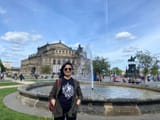Servus!
Welcome to Phisasfera, it's wonderful to have you here!
This is a website where you can casually learn about languages.
My name is Aki. I was raised in a multicultural family, which, kind of naturally, has helped my interest for languages expand. Currently I'm a B.A. student in Linguistics - so having the time of my life, hehe. I grew up as the youngest child amongst four in Japan. My father is a hardworking Japanese engineer and my mother a German teacher at a university. So yeah, this is how I'm always confused if I'm supposed to call Japanese and/or German my mother tongue (my answer changes depending on my mood).
My mother has been the one who brought wide range of cultures into our house - naturally, 'cause she has lived in many countries and made friends far and near.
Another sneak-peek into my upbringing: As a child, I was always amazed by my 7+-language-speaking mother. :) So many times she would be spoken to by tourists in Japan. And when they ask her the way in English, she often started with asking, "Where are you from?" And it was always my favourite moment when they name their country and my mother all of a sudden started speaking in their language. That delight on the faces, every time!
... So it's kind of funny to think what sort of cultural mixture I've had - starting from where? Well, maybe from my mother giving each of her children a Celtic name instead of a German, simply because she thought (and still thinks) the Irish and Scottish folklore is super cool (nope, we really don't have any family connections there).
Or maybe my father returning from business trips to Ireland with souvenirs, and me asking him with a serious face, "Did you meet the singer Enya this time?" Or when he returned from Korea: "Was everyone in that beautiful traditional Korean costume?" with the drawing in one hand.
*********
Towards my high school graduation, I was adamant enough to convince - no, rather, make my parents give up on persuading me to get into a university in Japan. Funny enough, I never properly explained why I wanted to go elsewhere - it was kind of instinctive, I think, that I "knew" I had to leave for a new place. I mean, I'd been in Japan for 19 years, it makes sense to take the next step to also get to know my European side, you know? (Whether you're convinced or not, that was such a repetitive phrase my parents heard from me back then)
And in August of 2021, I found myself in Budapest, Hungary. That's where I ended up spending two years studying Hungarian language and Hungarology, meeting new people with different backgrounds and making amazing friends, as well as growing as a person like never before.
Now, having four languages more or less as my second nature (, often getting confused among them too), I've just made a decision to go on an adventure with a website that looks like - well, this one that you're seeing now, essentially. :) As much as I dream it to be a place for you to get cozily inspired one way or another, it's also a place for me to experiment with my languages and linguistics and let them go wild - meaning, the articles will be written in as many languages as my brain allows me to, the number of which will also grow little by little!
I hope you enjoy sections for the languages you keep close to your heart, as well as get as infinitely long a which-language-to-learn-next list as mine with a bit of inspiration from here.
... So, get your tea ready and let your curiosity guide you!
With Love,
Aki
